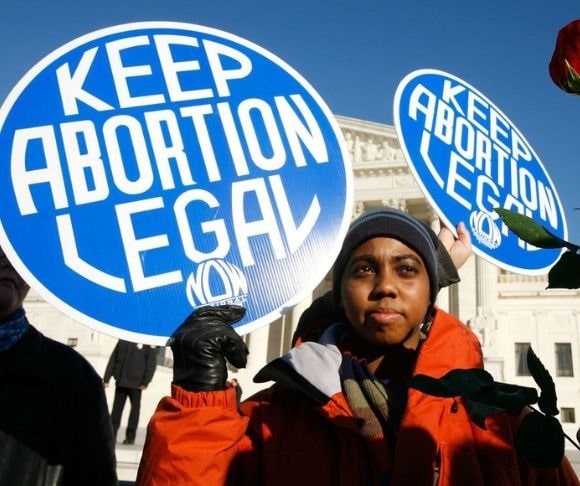Democratic Party politicians, the left-wing media, and abortion activists everywhere are in a panic. The leaked draft of Justice Samuel Alito’s opinion in Dobbs v. Jackson Women’s Health has the whole country imagining America without Roe v. Wade. Part II of Liberty Nation’s deep dive into the abortion laws of each so-called trigger state reveals more fake-news fearmongering by the left and the fact that not all 26 states may be so keen to ban abortion as the outraged media would have us believe. From Kentucky to Montana, here’s how the states really handle the issue.
Kentucky
Prior to Roe, Kentucky prohibited abortion except when deemed necessary to protect the life of the mother. In 1974, the state passed a law prohibiting public hospitals from performing the procedures except to save the life of the mother, but that was ruled unconstitutional by the Sixth Circuit Court of Appeals. After several years’ worth of failed attempts at passing a fetal heartbeat bill, the Kentucky legislature managed to pass a 15-week ban, overruling Democrat Governor Andy Beshear’s veto to do so. In addition to shortening the abortion window from 22 weeks to 15, this law also requires women to be examined by a doctor before receiving abortion pills and institutes new reporting requirements that abortion clinics in the state say are impossible to comply with immediately.
This new law was blocked by US District Judge Rebecca Grady Jennings quickly after passed, but she didn’t rule on the constitutionality of it. Instead, she focused on the claims of in-state abortion clinics that they wouldn’t be able to comply with the new requirements without clearer guidelines. This law will take effect immediately should Roe be overruled, according to local reports.
Louisiana
Louisiana implemented 89 abortion restrictions between the 1973 Roe ruling and 2020, according to a report from the Guttmacher Institute, though some have been struck down by the courts. Additionally, Louisiana was the only state not to have adopted some form of therapeutic (medical emergency) exception to its abortion ban by the time Roe was decided.

Justice Samuel Alito (Photo by Chip Somodevilla/Getty Images)
By the laws currently in effect, a woman can have a surgical abortion up to 20 weeks gestational age, which usually correlates to about 22 weeks after the last menstrual period (LMP). Abortion pills are allowed only up to about nine weeks, and a sonogram may be necessary to determine how far along the gestation is. Any abortion beyond that 20th gestational week requires either a fatal fetal abnormality or a medical emergency that threatens the life of the mother.
A law restricting abortions to 15 weeks was signed into law in 2019, and it will take effect if and when Roe is overruled. After the release of the leaked SCOTUS draft by Justice Samuel Alito, lawmakers in Louisiana introduced the Abolition of Abortion in Louisiana Act of 2022. If passed, this would redefine a “person” as any individual human being from the moment of fertilization, thus extending the protection of state homicide laws to the unborn. This law doesn’t exempt aborting mothers, meaning that, if passed, this law could lead to any pregnant woman who aborts at any point in the pregnancy facing prosecution for murder. If passed by the legislature, it will be up to Governor Jon Bel Edwards, an anti-abortion Democrat, to sign. He has not yet said whether he would sign or veto the bill.
Michigan
Michigan does not have a modern Roe trigger law, but an old law from 1931 has folks concerned. “If Roe v. Wade were to be overturned, a 1931 Michigan law would go into place, leaving no exceptions for abortion in cases of rape, incest or medical emergencies, and which could throw women and doctors into prison,” Politico reports. Governor Gretchen Whitmer filed a lawsuit last month to have the law overturned, and Michigan Attorney General Dana Nessel said on Mother’s Day that she would refuse to enforce the “draconian law.” The relevant law, Michigan Penal Code Act 328 of 1931, reads:
“Administering drugs, etc., with intent to procure miscarriage – Any person who shall wilfully [sic] administer to any pregnant woman any medicine, drug, substance, or thing whatever, or shall employ any instrument or other means whatever, with intent thereby to procure the miscarriage of any such woman, unless the same shall have been necessary to preserve the life of such woman, shall be guilty of a felony, and in case the death of such pregnant woman be thereby produced, the offense shall be deemed manslaughter.”
Despite the claims of the left, that law does allow medical exceptions and makes no mention of criminal penalties against the mother. If Roe is overruled and the Michigan Supreme Court doesn’t rule the 1931 law unconstitutional, it will technically be in effect. However, the AG’s refusal to enforce likely renders it powerless – for now. Attorneys general at the state level are elected officials because, as Harvard University’s Jim Tierney – a former AG himself – put it, “[s]tate constitutions have a healthy fear of executive power. They don’t want the governor to have legal power.” In the 1990s, Tierney, acting as attorney general of Maine, refused to defend a state law he felt was without merit – and the state supreme court upheld his authority to do so. But a case in Maine from the ‘90s doesn’t necessarily guarantee AG Nessel’s refusal would be similarly upheld in Michigan if challenged by anti-abortion advocates.
Minnesota
The currently active law in Minnesota states that any abortion after 20 weeks’ gestation must be due to a medical emergency or a “fetal anomaly incompatible with life.” This won’t change if Roe is overturned, as there are no trigger laws in place. The state legislature is split between a slight Democrat majority in the House and slight GOP majority in the Senate, and the state’s governor is a pro-abortion Democrat. However, there is fear that the leaked Alito draft could shake up the midterm and gubernatorial elections in November.
Mississippi

Governor Tate Reeves (Photo by Rogelio V. Solis-Pool/Getty Images)
Mississippi’s abortion ban had an exception for saving the life of the mother by the late 1800s. It became legal for pregnancies caused by rape in 1966 and incest in 1972. After Roe, all abortions were legal up to 20 weeks. In 2018, however, Governor Tate Reeves signed into law the 15-week abortion ban that sparked the Dobbs v. Jackson Women’s Health case currently before the US Supreme Court – the case that, should Alito’s leaked draft stand, would overrule Roe v. Wade and Planned Parenthood v. Casey. In 2019, a stricter law was signed. If Roe is overruled, the newer law would take effect, and abortion past the point a fetal heartbeat is detected would be allowed only if necessary to save the mother’s life.
Missouri
In Missouri, medical abortions are offered up to ten weeks after the LMP, and surgical abortions can be had up to 21 weeks and six days post-LMP. If the woman’s health is threatened, a surgical abortion can be administered at any point in the pregnancy.
According to the state’s trigger law, passed in 2019, anyone who administers an abortion beyond the detection of a fetal heartbeat, other than to save the life of the mother, is guilty of a Class B felony, punishable by no less than five and no more than 15 years in prison. The bill also includes a stipulation that the mother herself will not face criminal prosecution.
Another proposal seeks to block out-of-state abortions for Missouri residents by allowing private citizens to sue the out-of-state abortion provider or anyone who helps transport a Missouri resident across state lines to a clinic.
If Roe is eliminated, Missouri will outlaw abortions past about six weeks that aren’t necessary to save a mother’s life, and traveling across state lines to terminate may soon be off the table as well.
Montana

Governor Greg Gianforte (Photo by William Campbell/Getty Images)
In Montana, abortions are currently legal up to the point of viability, defined as the gestational age of 20 weeks, with post-viability exceptions to save the life of the mother. Governor Greg Gianforte signed three bills in 2021, however, that are currently tied up in the state judicial system. They would ban abortion after 20 weeks of gestation, require health care providers to offer ultrasound viewing before a woman can consent to the procedure, and prohibits the prescription and administration of abortion pills through telehealth.
Montana is another state, however, that enshrines a right to privacy explicitly in its constitution. In 1999, the state’s supreme court ruled that the right to privacy extended to a woman’s access to an abortion – that’s the decision Planned Parenthood is using to challenge the three new Montana laws, not Roe. Even if Roe is overruled, the laws in Montana must be ruled constitutional at the state level. Attorney General Austin Knudsen filed a brief in January asking the state supreme court to overturn the 1999 opinion.
And Seven More …
Just as with the first seven states covered in America Without Roe: Abortion Laws Across the States – Part I, none of those covered here would outright prohibit abortions from the point of conception without exception, no matter what the left-wing media say. Louisiana and Michigan come the closest, as the first had no therapeutic exceptions pre-Roe and the latter had such exceptions, but otherwise banned abortion from the point of conception. Even without Roe, however, neither state would likely go as strictly anti-abortion as it was in the past.
In Part III, we’ll examine another seven states, from Nebraska to South Dakota alphabetically.









